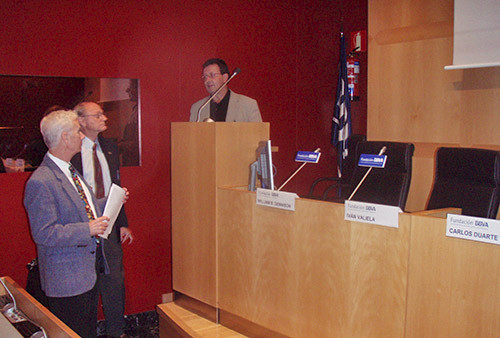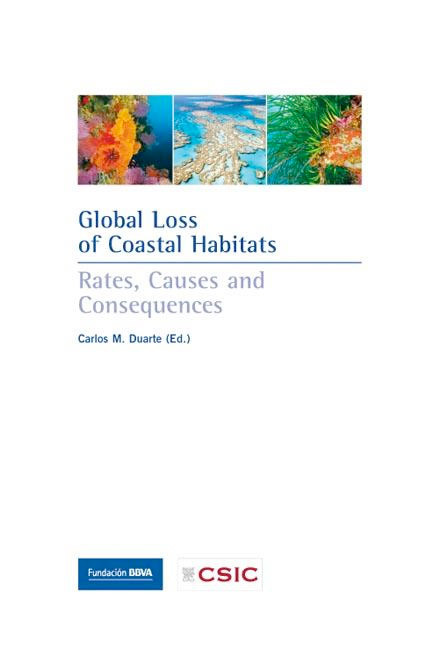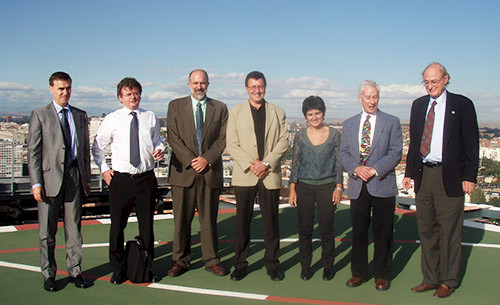Scott Nixon nourished our ecological souls
Bill Dennison ·Today I learned of the untimely death of my colleague Scott Nixon from the University of Rhode Island Graduate School of Oceanography. There will be eloquent eulogies in the ensuing weeks and months, as Scott had a profound impact on many students and colleagues. While I will leave the eulogies to those former students and colleagues who knew Scott well, I did have a wonderful experience with Scott in October 2007 in Madrid, Spain that I am reflecting on.
My friend Carlos Duarte put together a panel of coastal marine scientists to look at the issue of “Global loss of coastal habitats: Rates, causes and consequences”. Nuria Marba and I focused on seagrass meadows, Terry Hughes focused on coral reefs and Ivan Valiela focused on mangrove forests and salt marshes. Originally Scott Nixon was to be the salt marsh expert, but he developed a thoughtful and intellectually captivating discourse on coastal marine degradation that transcended salt marshes, and Ivan expanded his purview to include salt marshes.


We traveled to Madrid, sponsored by the BBVA Foundation, a foundation associated with BBVA, a large bank serving Europe and Latin America. As I entered the hotel in downtown Madrid, across the street from the famed Prado Museum, the Prime Minister of Spain was walking out, surrounded by media folks. This followed a business class flight to Madrid, so I began to appreciate the level of support and the respect that the BBVA Foundation afforded its guests. When we were walking around the BBVA Foundation headquarters, I recognized some paintings that I had just seen displayed at the Prado—another indication that this was a well-sponsored program. We had some wonderful dinners together, which our Spanish hosts thoughtfully began at 10:30 pm, much earlier than the typical Spanish mealtime, to accommodate their guests. At these events, Scott was a real raconteur, entertaining us with funny, profound and interesting stories, but he was also a great listener. In my experience, Scott, at all times, was ‘good company’.

Scott led off the seminar and began to talk about the history of society’s relationship with the sea. He was eloquent and captivating as a speaker, drawing upon well researched examples, telling great stories with humor and wit. The only problem that I ever had with Scott’s talks was that they ended—I could listen to him endlessly. He went on to talk about nutrient enrichment in coastal ecosystems. Scott said that nitrogen was difficult to control because the sources were “irreplaceable, complex and widespread” and “nitrogen moves in many forms and in many ways”. In few words, he could capture key messages. He then spoke of the changing patterns in meat consumption in developed countries, changing patterns of tourism and the implications of this on nutrient cycles. These dimensions of the nutrient problems in coastal regions were well beyond the typical scientific seminar.
Scott closed his seminar with the following statement:
“As the great limnologist G.E. Hutchinson (1969) pointed out, the term “eutrophic” was used in medicine to mean “well-nourished”, long before it was taken up by ecologists. If the human population really becomes “eutrophic” by eating less meat and animal fat, it will go a long way to protecting the coastal marine environment from eutrophication.”
This talk, like so many that Scott gave, drew upon the scientific literature, provided societal examples, created novel syntheses, and communicated findings and conclusions eloquently by weaving it into a compelling story. He did this with great humor, often self-deprecating, and made for memorable discussions that inspired me (and others) to strive for a more complete understanding of ecology and also to made a positive impact on society. It occurs to me that what I most enjoyed about Scott was that he eutrophied our minds, in the G.E. Hutchinson sense of the word. In short, Scott Nixon provided nourishment to our ecological souls.
About the author
Bill Dennison

Dr. Bill Dennison is a Professor of Marine Science and Interim President at the University of Maryland Center for Environmental Science (UMCES).